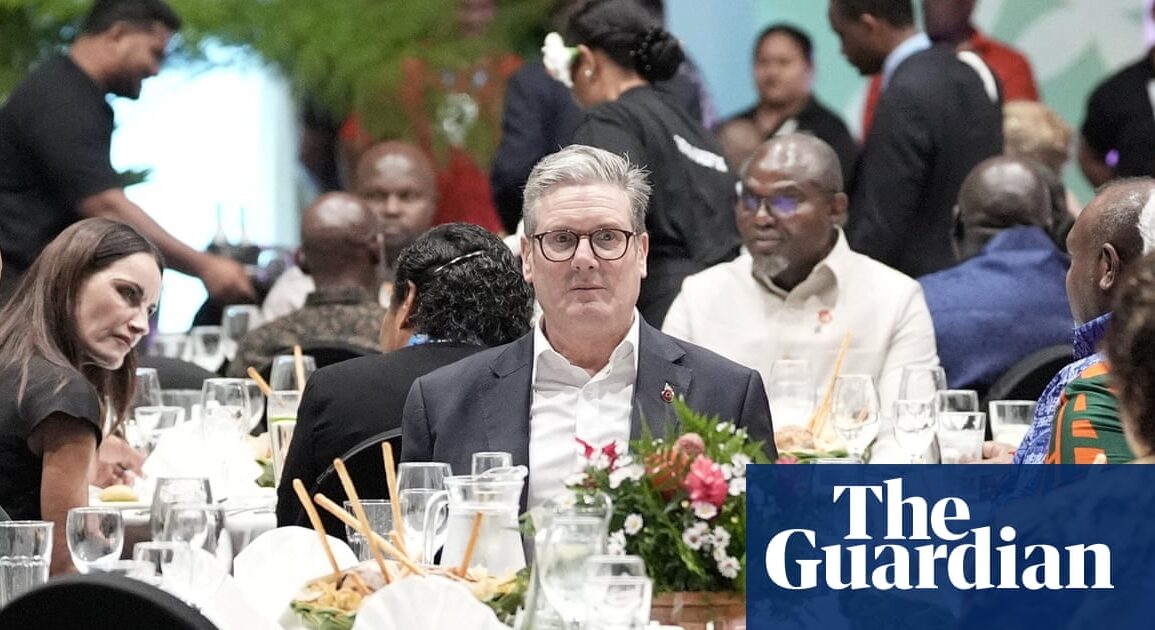
Britain has a legal and moral case to answer over its historical role in slavery, the chair of the Caribbean’s slavery reparation commission has said, as Keir Starmer continues to reject calls to put the issue on the agenda at the Commonwealth summit.
Responding to the British prime minister’s insistence to “look forward” rather than have “very long endless discussions about reparations on the past” when he meets 55 other country leaders on Friday, the distinguished Caribbean historian Sir Hilary Beckles, who chairs the Caribbean governments’ reparations body, articulated the region’s call to the British government and institutions to “engage in a compassionate, intergenerational strategy to support postcolonial reconstruction”.
The Caribbean Community (Caricom) reparations committee, which acts on behalf of 15 Caribbean governments and six associate members, has a 10-point reparatory justice plan, covering an apology and actions to address the enduring socioeconomic impacts of slavery.
Beckles’ strongly worded piece for the Guardian, which outlines the legal, ethical and moral justification for slavery reparations and reflects the views of Caribbean nations, follows weeks of political wrangling as Caribbean governments pushed for the matter to be discussed at Chogm and Starmer dug in his heels, saying that the UK was focused on “facing real challenges on things like climate in the here and now”.
Addressing Downing Street’s stance that the UK would not – now or ever – participate in the payment of any form of reparation, Beckles writes: “On the first matter, nothing could be further from the truth. Reparations are in the mouths and on the minds of all participants, and the formal agenda does not determine the real agenda. It is just a conciliatory framework for the moment, and does not reflect what in fact is a supportive movement.”
Pointing to the fact that slavery enriched Britain, Beckles said: “While imperial Britain soared to sustainable economic development and global military superpower status, the enslaved and their descendants were left to this day with enduring pain, persistent poverty and systemic suffering.”
He described the Slavery Abolition Act as “the most racist legislation ever passed in the British parliament” adding it defined 700,000 enslaved black people as “property”, rather than humans.
The piece continues: “Global opinion, however, has rallied around the idea – rooted in international law and bolstered by the best ethical and moral thinking – that there is a case to answer and that negotiations should be inevitable. In 1939, Arthur Lewis, a Nobel laureate in economics, set it out clearly. Britain, he said, had 200 years of free labour from an estimated 20 million black men, women and children. This was Britain’s black debt, which must be acknowledged and repaired.”
Some Caribbean officials have already made it clear that the region will not back down on the issue, with the Bahamas’ foreign minister, Frederick Mitchell, telling the BBC’s Today programme that it was “only a matter of time” before Starmer “changes” his position on reparations, adding that it is “unusual to us because you’ve got the Labour party in power”.
Mitchell said: “And this, we thought was something that the Conservative party in the UK would be the progenitor of, and that Labour would certainly change its position on this.”
When asked about the issue, the outgoing Commonwealth secretary general, Patricia Scotland, told the Guardian: “One of the benefits of the Commonwealth platform is that everybody is around that table – everybody who is affected, every region who participated in any way is around the table, because quite often in other spheres, someone is left out …
“Our leaders have the opportunity to discuss if they wish to, but it’s up to them. The secretariat does not dictate the agenda, and it does not take sides. We are here to serve.”
The Commonwealth summit, which happens every two years, is a platform for leaders of the 56-member bloc to meet to discuss shared concerns and solutions. Historically, the intergovernmental organisation has played a role in addressing serious issues such as apartheidd in South Africa.
At the heart of its operations is the Commonwealth charter, which was signed by the late Queen Elizabeth II in 2013. The charter is built on 16 principles, including support for small and vulnerable nations and a commitment to equality.


